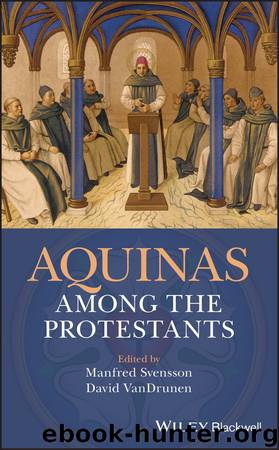Aquinas Among the Protestants by Svensson Manfred & David VanDrunen

Author:Svensson, Manfred & David VanDrunen
Language: eng
Format: epub
ISBN: 9781119265986
Publisher: John Wiley & Sons, Inc.
Published: 2017-09-12T00:00:00+00:00
In Kühn’s consideration, then, a mutual correction and complementing takes place.
Wolfhart Pannenberg
In Wolfhart Pannenberg’s chief work, the three‐volume Systematische Theologie, Thomas Aquinas is one of the most frequently quoted theologians. Aquinas, however, is neither Pannenberg’s only nor main reference. In his highly scholarly work, he deals with a host of persons and problems in the history of Christian theology and of philosophy. To see how Pannenberg deals with Aquinas it is not enough to look at all the places where Pannenberg explicitly refers to him. It is much more profitable to compare Pannenberg’s systematic conception with that of Aquinas. Then one can consider some places where Pannenberg explicitly argues with Aquinas and see where he makes decisions which take him in a different direction from Aquinas.
Pannenberg’s central motivation as a theologian is an apologetic one. In the first place he writes against the secularization of the Western world and, in the second place, he is also aware of the rival situation in which Christianity and the other religions stand. There are several types of apologetics, however, and one has to see which type Pannenberg represents. In the foreword to the second volume of the Systematische Theologie Pannenberg says that Christianity may not renounce the claim to truth for the revelation upon which it is based. But to plead this claim in a credible way requires receiving the plurality of claims for truth and the controversiality of truth into one’s own consciousness (1991–8, 2: xii). Christian theology has to take some steps to prove the truth of its claim. It may not presuppose the truth of Christian revelation, or else it would turn this truth into a merely subjective conviction – and this would be little less than an objective untruth (1991–8, 2: xiii). One possible test for such truth is the possession of a coherent interpretation of the world, including humankind and its history, on the presupposition of a certain concept of God (1991–8, 1:167–8). Pannenberg concedes that this interpretation of the reality of the world will remain controversial (1991–8, 2: xiv–v), insisting on the position for which he had already pleaded in his Wissenschaftstheorie und Theologie: that God can be the subject‐matter of theology only as a hypothesis (1973, 302–3, 344–8). The truth of the existence of God and of the Christian revelation will only become undoubtedly certain by the consummation of time and history, by the real coming of God’s kingdom (1991–8, 3: 531). Pannenberg holds that this truth remains controversial until this eschatological event, not only for nonbelievers but also for believers themselves. Also for them truth remains something external. It can only exist in the external reality of the experience of this world, and until then the interpretation of this experience is controversial; the truth of the Christian revelation is not certain. To claim that for believers it is already certain would be subjectivism, as with Barth (Pannenberg 1973, 278).
Pannenberg’s point of view is not defined by a confessional controversy between claims to the true –
Download
This site does not store any files on its server. We only index and link to content provided by other sites. Please contact the content providers to delete copyright contents if any and email us, we'll remove relevant links or contents immediately.
The Secret Power of Speaking God's Word by Joyce Meyer(3222)
Signature in the Cell: DNA and the Evidence for Intelligent Design by Stephen C. Meyer(3138)
Real Sex by Lauren F. Winner(3023)
The Holy Spirit by Billy Graham(2953)
The Gnostic Gospels by Pagels Elaine(2532)
Jesus by Paul Johnson(2363)
Devil, The by Almond Philip C(2333)
23:27 by H. L. Roberts(2252)
The Nativity by Geza Vermes(2233)
Chosen by God by R. C. Sproul(2165)
All Things New by John Eldredge(2162)
Angels of God: The Bible, the Church and the Heavenly Hosts by Mike Aquilina(1969)
The Return of the Gods by Erich von Daniken(1946)
Angels by Billy Graham(1926)
Knowing God by J.I. Packer(1860)
Jesus of Nazareth by Joseph Ratzinger(1811)
The Gnostic Gospel of St. Thomas by Tau Malachi(1799)
Evidence of the Afterlife by Jeffrey Long(1790)
How To Be Born Again by Billy Graham(1782)
